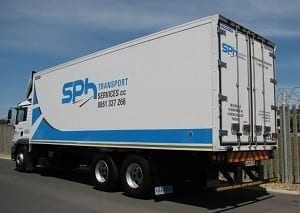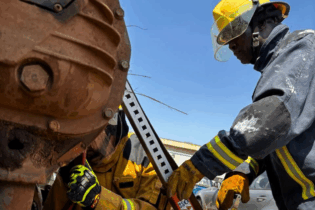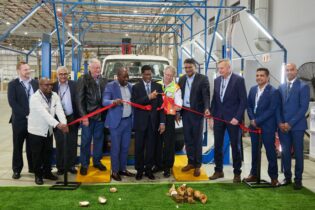A range of new technologies are being used inside refrigerated truck trailers in South Africa, as Transport World Africa discovers.
Some of these technologies include thermal dividers and partitions, and air strip curtains, which are fitted to the rear doors of refrigerated trailers. “Serco uses high-density foam in panels for maximum thermal control,” says managing director Clinton Holcroft. Refrigerated trailer insulation in South Africa, in general, continues to improve through the introduction of the country’s first dedicated thermal chamber, which is similar to what is used in Europe. Having a test chamber in South Africa is good for the local refrigerated transport industry as it means the issue of trailer insulation will receive more attention in the future. With the introduction of the thermal chamber later this year, there will be a new yardstick that will assist in measuring refrigerated installations. The use of air suspension on refrigerated trailers further reduces the level of vibration on the road surface, which reduces the amount of damage to fresh produce. Air suspension comes into its own when transporting sensitive cargo, where adjustable heights are required or with special applications. If the return leg of a journey is undertaken with an empty trailer on bumpy roads where no ballast can be added, then it may be worthwhile to purchase an air suspension trailer to avoid excessive bouncing,” says Fred Evans, of Polyflex Urethanes. However, air suspension costs far more in capital expenditure and is more costly to maintain and repair in the event of damage,” he adds.Further road securing measures, such as straps and shoring bars, also reduce the likelihood of damage. Most local trailer manufacturers offer a wide range of securing devices.
It is possible to monitor the temperature of trailers remotely, Holcroft says. “Remote temperature monitoring is popular in Europe and is now growing in South Africa. We have partnered with Ikhaya Automation, which is among the leading local specialists in this field. There are practical benefits to installing remotes; they proactively identify the temperature and ensure the product is delivered at the correct temperature. Praba Moonsamy, managing director, Ikhaya Automation, says an electronic system is installed onto the truck body, which feeds real-time information to clients. “We act as a type of intermediary between transporters and producers/cargo owners and can establish what went wrong and where – at any stage in the cold chain. We issue real-time reports and send customers SMS or email notifications on the temperature status of their transported goods. “Our system is integrated into major telematics service provider systems so that customers can see everything from a single screen. We complete the cold chain and can monitor pack houses, vehicles, distribution centres and end-customer facilities. Due to the weakening rand, everyone is looking at savings mechanisms. In terms of perishable goods, they want to save more loads, limit the number of insurance claims, reduce premiums and, ultimately, be more proactive in the entire process,” he says. Holcroft adds that South African customers have become increasingly concerned about the integrity of their cargo in light of the recent high temperatures/heat wave experienced in the country. “This has placed added pressure on the ability of service providers in the cold logistics chain to maintain the freshness of their transported goods. Maintaining the cold chain is crucial, as it impacts the shelf life of a number of products.”






